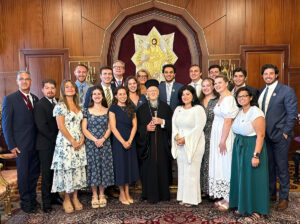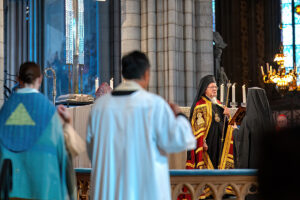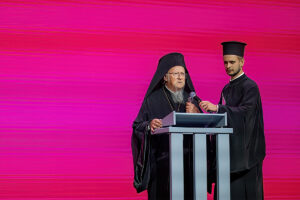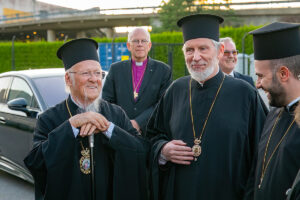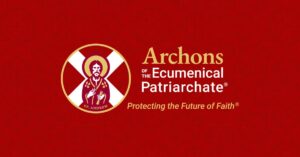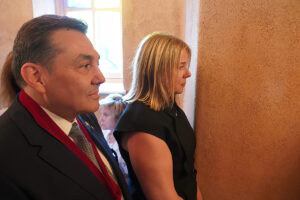Today’s Zaman newspaper recently reported on ‘Turkey’s top Muslim cleric calls for reopening of Greek seminary in visit’.
Today’s Zaman is one of two English-language dailies based in Turkey and reports on domestic and international coverage. The published article can be read in its entirety below.
Turkey’s top Muslim cleric calls for reopening of Greek seminary in visit
7/5/2012
Read this article on the website of Today’s Zaman.
The president of Turkey’s Religious Affairs Directorate, Professor Mehmet Görmez, has voiced his support for the reopening the Greek Orthodox Halki (Heybeliada) Seminary, which has been closed since 1971, saying that it is a fundamental right of non-Muslims living in Turkey to raise their own theologians.
“As the Religious Affairs Directorate, we see non-Muslim citizens living in Turkey as an integral part of this country. Regarding religious freedoms — freedom of religion, freedom to receive an education and the sacredness of places of worship — we demand for them the same rights that we demand for ourselves. We think it is a fundamental right for people from every ethnicity and religion not only in our country but also in every part of the world to practice their religion freely, educate their children in accordance with their beliefs and raise their own theologians,” Görmez told reporters on Thursday.
The remarks from Turkey’s top Muslim cleric came following a historic meeting with Ecumenical Patriarch Bartholomew I at the İstanbul-based Fener Greek Orthodox Patriarchate. “A religious community’s dependence on other countries to raise their own theologians does not befit Turkey as a major country. I would like to note that its
Established in 1844 on the island of Heybeliada, Halki Seminary was closed in 1971 under a law that placed religious and military training under state control. It was the only school where Turkey’s Greek minority educated its clergy. The theological school once trained generations of Greek Orthodox leaders, including the current Patriarch Bartholomew, who is one of its 900 graduates. Civil society groups have long argued it that was closed unlawfully and that its reopening will require political will to bypass obstacles from anti-EU groups in Turkey. On the issue of reopening the Halki Seminary, Bartholomew said the government is supportive of the reopening of the school and that they are hopeful that it will be reopened.
The Greek Orthodox leader also noted that the infrastructure for the reopening of the seminary is ready and once permission is given, the seminary could be opened the following day. The school has been well maintained since there is a functioning monastery on its premises. The meeting between Görmez and Bartholomew is considered especially important as Görmez is only the second head of the Religious Affairs Directorate to visit the Greek Orthodox Patriarchate.
The patriarch had congratulated Görmez on his appointment as chief of the directorate in 2011 and invited him to the patriarchate. The first visit to the patriarchate was paid by then Religious Affairs Directorate President Mehmet Nuri Yılmaz in 2001.
Accompanied by İstanbul Chief Mufti Rahmi Yaran, Görmez arrived at the patriarchate at noon. The historic meeting between Görmez and Bartholomew was broadcast live on Diyanet TV.
During the meeting, Görmez said he is very happy about paying a visit to patriarchate and exchanging views on the issues which concern both Muslims and Greek Orthodox.
“We have been meeting on various occasions, but we would like to visit you at your place and exchange views. Sharing the same homeland for centuries, we wanted to discuss our issues in common. I think we should frequently come together to discuss the situation of Muslims in the Orthodox world and the situation of Orthodox Christians in the Islamic world in particular,” Görmez told the patriarch.
Bartholomew said they are very happy and honored by Görmez’s visit, which he described as a “gesture,” and he expressed his best wishes to Muslims for the Night of Forgiveness (Berat Kandili in Turkish), which was observed on Wednesday, and for Ramadan and Eid al-Fitr (a three-day religious festival that marks the end of the holy month of Ramadan) in advance of the holiday for Muslims across the world.
He also said they were very pleased with Görmez’s statements supporting the reopening of the Greek seminary and offered his thanks to the Muslim cleric for his support.
Bartholomew and Görmez presented gifts to each other before lunch at the patriarchate. The religious leaders later visited the Aya Yorgi Church in the courtyard of the patriarch.
Meanwhile, Justice and Development Party (AK Party) spokesperson and Deputy Chairman Hüseyin Çelik voiced his support for reopening the Halki (Heybeliada) Seminary, saying that keeping the seminary closed is a mistake.
“It is a humanitarian and Islamic duty to open the seminary. The closure of the seminary was a mistake, and keeping it closed is another mistake. There is no legal obstacle before the reopening of the seminary. This [reopening of the seminary] is a right,” Çelik said in remarks that appeared in the Radikal daily on Thursday.
He said it is possible to reopen the seminary within 24 hours once a decision is made to this effect and that the arguments put forward to keep the seminary closed have no validity.
Çelik also noted that those opposed to the reopening of the seminary on Islamic grounds were greatly mistaken and called on these circles to empathize with the Greeks.
“There is now an Islamic university in Rotterdam. Five hundred students study theology there. Religious communities and sects have their extensions and institutions in Europe. There are 5,000 mosques in Europe, one-third of which were previously churches. We need to be honest and empathize with them. Muslims will open


